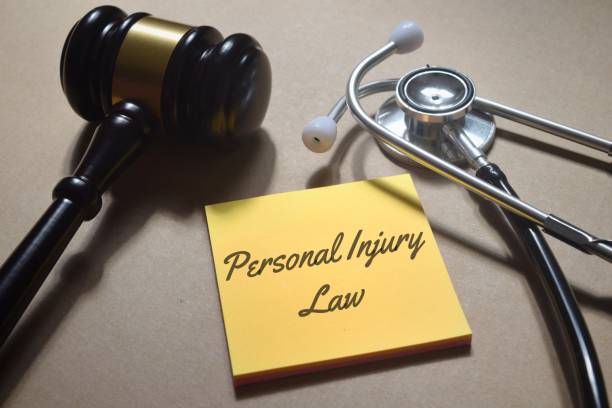What Do You Need To Do After Personal Injury Accidents?

Accidents happen, and when they do, they can leave you dealing with physical pain, emotional stress, and financial burdens. Whether you’ve been injured in a car accident, slip and fall incident, workplace mishap, or any other unfortunate event, knowing what steps to take after a personal injury is crucial to protect your well-being and legal rights. In this comprehensive guide, brought to you by Pinkston Law Group, P.C., we will walk you through the essential actions to take following a personal injury. By following these steps, you can ensure that you receive the care you need and pursue the compensation you deserve,
Below are the following steps to take after experiencing personal injury:
Seek Immediate Medical Attention
- The Importance of Medical Care
After a personal injury, your health should be your top priority. Even if your injuries seem minor at first, it’s crucial to seek immediate medical attention. Some injuries may not manifest symptoms right away, and prompt medical care can prevent conditions from worsening. Delaying treatment could also harm your chances of obtaining compensation later.
When you seek medical attention, be honest with your healthcare provider about how the injury occurred and any symptoms you’re experiencing. This information will be crucial for diagnosing and treating your condition effectively.
- Documenting Your Injuries
In addition to seeking medical care, documenting your injuries is vital for your personal injury claim. Take photos of your injuries as soon as possible after the incident. Photographs provide visual evidence of the severity of your injuries and can be valuable when negotiating with insurance companies or presenting your case in court.
Remember to keep all medical records, bills, and receipts related to your treatment. These documents will help establish a clear link between the accident and your injuries, making it easier to seek compensation later.
Report the Incident
- When and How to Report
Depending on the nature of the incident, it may be necessary to report it to the appropriate authorities. Reporting the incident helps create an official record and ensures that the responsible parties are held accountable. For example:
– In a car accident, contact the police to file a formal report.
– If you slip and fall on someone else’s property, report the incident to the property owner or manager.
– Workplace injuries should be reported to your employer or supervisor.
- Obtaining an Incident Report
Request a copy of the incident report if one is generated. This report will contain essential details about the incident, including the date, time, location, and the parties involved. Having an official record of the incident can be valuable when pursuing a personal injury claim.
Gather Information
- Collecting Essential Details
To strengthen your personal injury claim, gather as much information as possible about the incident. This includes:
– Names and contact information of all parties involved, including witnesses.
– Insurance information of the at-fault party (if applicable).
– Detailed notes about the events leading up to the injury.
– Photographs of the accident scene, any hazards, or contributing factors.
- Witness Statements and Contact Information
Witnesses can provide crucial testimony to support your claim. If there were witnesses to the incident, ask for their statements and contact information. Your attorney may need to contact them later to gather additional evidence or obtain their testimonies.
Notify Relevant Parties
- Notifying Insurance Companies
If the personal injury results from a car accident, slip and fall, or another incident involving insurance, you should notify your insurance company as soon as possible. Provide them with the necessary information about the incident. However, be cautious when dealing with insurance companies, as they may try to minimize your claim.
It’s advisable to consult with an attorney before speaking extensively with insurance adjusters. An attorney can help you navigate the claims process and negotiate with insurance companies on your behalf.
- Workplace Injuries and Workers’ Compensation
If you were injured at work, report the injury to your employer immediately. Most states require employers to carry workers’ compensation insurance, which provides benefits to employees injured on the job. You may be entitled to medical coverage and compensation for lost wages through this system.
Consult with an Attorney
- The Benefits of Legal Representation
While not all personal injury cases require legal representation, consulting with an attorney can significantly benefit your claim. An experienced personal injury attorney can:
– Evaluate the strength of your case.
– Provide guidance on the legal process.
– Negotiate with insurance companies for a fair settlement.
– Represent you in court if necessary.
- When to Hire a Personal Injury Attorney
You should consider hiring a personal injury attorney if:
– You’ve sustained severe injuries.
– Liability is disputed or unclear.
– The insurance company offers a low settlement.
– Your case involves complex legal issues.
– Negotiations with the insurance company are unsuccessful.
An attorney can help you understand your rights and options, ensuring you receive the compensation you deserve.
Preserve Evidence
- Protecting Critical Evidence
Preserving evidence is crucial for the success of your personal injury claim. Evidence can include photographs, medical records, accident reports, and more. It’s essential to safeguard this information to support your case.
Avoid repairing or disposing of damaged property or evidence until advised by your attorney. Any alterations to the scene or critical evidence could weaken your claim. Your attorney will guide you on how to preserve and present evidence effectively.
- The Role of Documentation
Throughout your recovery, maintain detailed records of your injuries, medical treatment, expenses, and any other relevant information. Documentation helps establish a clear connection between the accident and your damages. This information will be essential when seeking compensation for medical bills, lost wages, pain, and suffering.
Follow Medical Treatment
- The Importance of Compliance
Consistency in following your prescribed medical treatment plan is essential. This demonstrates your commitment to your recovery and helps ensure the best possible outcome for your injuries. Failing to adhere to medical advice can be used against you during legal proceedings, potentially reducing your compensation.
Attend all recommended medical appointments, take medications as prescribed, and follow any rehabilitation or therapy instructions. Keep detailed records of your progress, including symptoms, improvements, or setbacks.
- Maintaining Medical Records
Keep copies of all medical records, bills, and receipts related to your treatment. These documents provide concrete evidence of your injuries, the treatment you’ve received, and the associated costs. Your attorney will use this information to calculate the damages you’re entitled to and to build a strong case on your behalf.
Communicate Cautiously
- Social Media and Personal Injury Claims
In today’s digital age, it’s essential to be cautious about what you share on social media after a personal injury. Insurance companies and opposing parties may monitor your online presence to gather evidence that could be used against you. Avoid posting about your accident, injuries, or activities that could contradict your claims of pain or disability.
- Statements and Recorded Conversations
Be mindful of what you say to insurance adjusters, opposing parties, or anyone else involved in the case. Statements made during conversations or recorded interviews can be used as evidence. It’s often best to consult with your attorney before providing any statements to ensure your rights are protected.
Stay Informed
- Keeping Track of Your Case
Throughout the legal process, stay informed about the progress of your case. Maintain open communication with your attorney and ask questions if you have any concerns or uncertainties. Understanding the steps being taken on your behalf can provide peace of mind during a challenging time.
- Understanding Your Rights and Responsibilities
Educate yourself about your rights and responsibilities in your personal injury case. Your attorney can guide you in this regard, but having a basic understanding of the legal process and your role in it will help you make informed decisions and actively participate in your case.
Why Choose Pinkston Law Group, P.C.
At Pinkston Law Group, P.C., we specialize in personal injury cases and a range of other legal areas, including family law, civil rights litigation, and employment law. Our experienced team of attorneys is dedicated to providing exceptional legal representation and personalized guidance to our clients.
Contact Us Today
If you or a loved one has suffered a personal injury, don’t navigate the complexities of the legal system alone. Our attorneys at Pinkston Law Group, P.C. are here to help you every step of the way. With our expertise, dedication, and commitment to achieving the best possible outcomes for our clients, you can trust us to fight for your rights and seek the compensation you deserve.
Contact Pinkston Law Group, P.C. today to schedule a consultation and take the first step towards a brighter legal future. Your well-being and legal rights are our top priorities, and we’re here to advocate for you. Let us be your trusted partners in pursuing justice and the compensation you deserve.
In conclusion, after a personal injury, taking the right steps is crucial to protect your health and legal rights. Seek medical care, document the incident, gather information, report it, consult with an attorney, preserve evidence, follow the medical treatment, communicate cautiously, stay informed, and understand your rights. When you need experienced, dedicated legal representation, choose Pinkston Law Group, P.C. Contact us today, and let us help you on your journey to recovery and justice.





